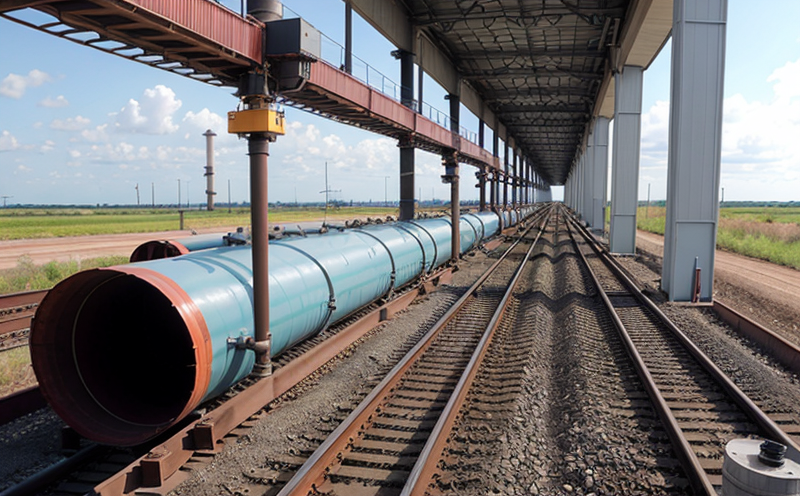Industrial pipeline flow inspection
The integrity and reliability of industrial pipelines are critical to numerous sectors including oil & gas, petrochemicals, water utilities, and power generation. Pipelines transport vast amounts of hazardous materials over long distances with minimal loss or contamination. Regular and thorough inspections ensure the safe operation of these systems, preventing accidents that could result in severe environmental damage and significant economic losses.
Industrial pipeline flow inspection involves the systematic examination of pipelines to detect defects, corrosion, wear, and other anomalies that may compromise their structural integrity. This service typically includes non-destructive testing (NDT) methods such as ultrasonic testing (UT), magnetic particle testing (MPI), liquid penetrant testing (LPT), and radiography.
At our laboratory, we employ advanced inspection techniques to provide accurate and reliable flow inspection reports. Our team of experienced professionals utilizes state-of-the-art equipment and adheres strictly to international standards such as ISO 9712:2012 for welding inspectors and ASME V-Code for pressure vessels.
Our industrial pipeline flow inspection service ensures compliance with regulatory requirements, including those set by OSHA, EPA, and other relevant authorities. By maintaining robust pipelines, we contribute to the overall safety of our clients' operations and the environment.
International Acceptance and Recognition
The industrial pipeline flow inspection service is widely recognized across international standards and regulatory frameworks. Our laboratory's inspections are accepted globally as they comply with internationally recognized standards such as ISO 9712:2012, ASME V-Code, API Standard 653, and EN 14048.
Our expertise in industrial pipeline flow inspection is validated by our membership in prestigious organizations like the American Society of Mechanical Engineers (ASME) and the International Organization for Standardization (ISO). We also work closely with regulatory bodies such as the Occupational Safety and Health Administration (OSHA) and the Environmental Protection Agency (EPA).
Our commitment to international acceptance ensures that our clients receive reports that are universally recognized, enhancing their compliance efforts. This global recognition is crucial in ensuring seamless operations across different countries and jurisdictions.
Environmental and Sustainability Contributions
- Reducing the risk of pipeline failures leading to environmental contamination
- Promoting sustainable practices by preventing accidents that could harm ecosystems
- Conducting inspections that extend the useful life of pipelines, reducing resource consumption
- Minimizing downtime and operational disruptions through proactive maintenance
The industrial pipeline flow inspection service plays a pivotal role in promoting environmental sustainability. By identifying defects early, we help prevent catastrophic failures that could lead to significant environmental damage. Our inspections contribute to the longevity of pipelines, thereby reducing the need for premature replacements and minimizing resource consumption.
Through our efforts, we support clients in achieving their sustainability goals while ensuring safe operations. This proactive approach not only protects the environment but also contributes to a more resilient and sustainable industrial sector.
Use Cases and Application Examples
| Use Case/Example | Description |
|---|---|
| Petrochemical Plant Pipelines | Regular inspections of petrochemical plant pipelines ensure compliance with stringent safety regulations. These pipelines transport hazardous materials, and any failure can have severe consequences. |
| Water Supply Networks | Inspection of water supply networks helps identify leaks or corrosion that could compromise the quality of drinking water. This ensures public health is safeguarded. |
| Natural Gas Transmission Pipelines | Thorough inspections of natural gas transmission pipelines are essential for maintaining stable energy supplies and ensuring the safety of communities near pipeline routes. |
| Oil Refineries | Pipelines in oil refineries carry refined products that require careful monitoring to prevent leaks or spills. Our inspections help maintain operational efficiency and environmental integrity. |
The industrial pipeline flow inspection service finds application across various sectors, including petrochemicals, water utilities, natural gas transmission, and oil refineries. These use cases highlight the critical role of our inspections in ensuring safe and reliable operations across diverse industries.





